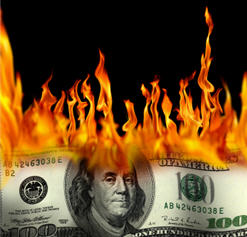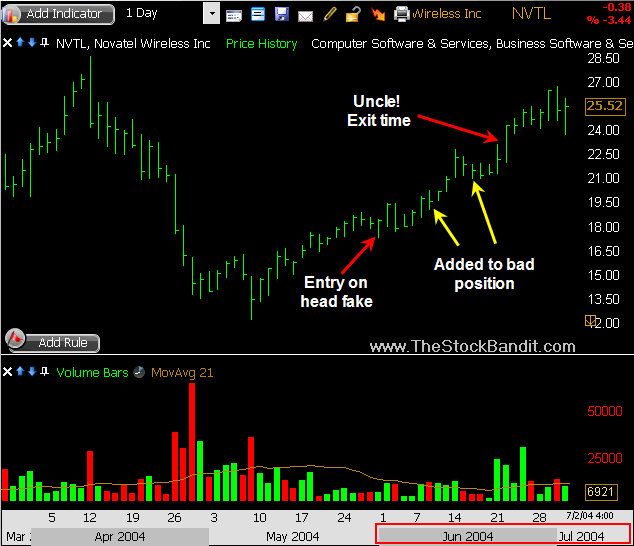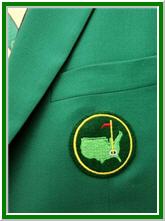 All Entries in the "Trading & Golf Series" Category
All Entries in the "Trading & Golf Series" Category
Lessons from My Biggest Trading Loss
May 28, 2009 at 9:58 am
 The trading has been really, really good lately. I’ve been fortunate to nail some nice moves for both day trading and swing trading timeframes, which of course is always fun.
The trading has been really, really good lately. I’ve been fortunate to nail some nice moves for both day trading and swing trading timeframes, which of course is always fun.
But in order to recognize and appreciate the good times, one must also go through some periods of poor performance. You have to struggle, and fight through the pain. Expensive lessons get learned, and thank goodness, they can stay with you for a while.
That’s what I’m here to tell you about in this post.
I want to show you some lessons I learned from the biggest trading loss I ever took, and hopefully you’ll benefit from my mistakes. After all, standing on someone else’s shoulders is the best way to look forward.
Setting the Scene
With summertime having arrived in 2004, the usual conditions were present. That means lighter trading volume – and whenever that’s the case, I tend to prefer short selling over buying. (I view volume as the fuel needed to propel a stock higher, so when it’s present, I realize bidders can simply disappear and the stock can slide without needing high activity.)
Having noticed a deep correction in NVTL which shaved off about 1/2 its value in just a few weeks, I had the stock on the radar and was waiting for a good setup. No harm so far.
It had begun a lazy, light-volume bounce off its correction low, which of course left me skeptical. I watched for the pace of the bounce to slow, and once it did, I started a position. That was on June 1 as it attemped to roll over slightly, but it was merely an attempt.
The following day, NVTL made a new recovery high, but I stayed in the position. Mistake #1. As soon as the bounce resumed, that was grounds for dismissal, but I stuck around in a stubborn fashion. A week later, NVTL was again on the move, and I found my P&L turning deeper red by the day.
I was wrong, and it hurt. So I did what any trader in the midst of breaking trading rules would do – I added to my position. Mistake #2. Now I’m in a bad trade and I have too much of it. Why? Because I needed to be right. Mistake #3.

StockFinder Chart courtesy of Worden
Long story short, after adding a couple of times on the way up to improve my basis, I ultimately drew a line in the sand which was crossed 3 weeks after my entry. I blew out of the trade… stunned, bruised, and yet relieved.
Ultimately NVTL corrected, but I would have had to hold the position for another month and endure another 10% against me before that happened. Even then, I only would have been able to exit at breakeven.
It was a nasty loss, and it angered me to have allowed it. Now 5 years later, I still shake my head at the series of mistakes I made, but it’s a great reminder to me of what can happen when I allow myself to break my rules.
Reminders & Takeaways
- “Paper” losses are very real. Many try to fool themselves into thinking that because a gain or loss hasn’t been realized, that it should be viewed differently. Wrong. If you’re underwater in a position, you’re losing whether it’s a closed or open position.
- Adding to losing trades is a recipe for pain. If you’re already in the hole and you’re already in the size of position you originally intended to be in, you stand to dig a deeper hole and cloud your judgment even more. Don’t add to a losing position when it’s a hail-mary effort at escaping a bad trade.
- Accepting a big loss can bring about some needed relief. For one, you’re ending the loss – it can get no worse. That’s a big reduction of stress and distractions from your other trading efforts, which is a huge benefit. You’re also accepting that you were wrong, and creating some closure which mentally helps you move on. There’s no substitute for a clear head when trading, so take it. Further, there are few things worse than logging into your trading platform and staring at a giant loser day after day.
- Being early = being wrong. This trade ultimately moved back in the direction I thought it would, but not until it had far exceeded my “uncle” point. Just goes to show that the market can continue moving against you for longer than you can handle it sometimes, so it’s never worth arguing with.
If I could get away with only talking about my great trades here, it might be more enjoyable for me, but you’d take less away from it as a reader.
And the reality is that I lose on plenty of trades. But there is much to be gleaned from glancing in that rearview mirror, both for me and for you. That’s how we get better!
Sometimes it comes with a grin and sometimes with a grimace, but it always offers valuable lessons to gain from. I hope you’re willing to do the same with your own trades.
Are you watching the Trading Videos over at TheStockBandit.TV?
Jeff White
President, The Stock Bandit, Inc.
Swing Trading & Day Trading Service
www.TheStockBandit.com
[tags]Stock Market, Day Trading, Stock Trading, Investing, Swing Trading[/tags]
7 Trading Lessons from the Masters
April 13, 2009 at 1:58 pm
 As a trader who loves my job, I find it difficult to witness any big event without looking for some parallels to trading. The sports arena is one of those places, and it doesn’t take much of a stretch of the imagination to recognize frequent lessons that are applicable to trading.
As a trader who loves my job, I find it difficult to witness any big event without looking for some parallels to trading. The sports arena is one of those places, and it doesn’t take much of a stretch of the imagination to recognize frequent lessons that are applicable to trading.
Just about anytime someone’s talent or emotions are being tested, you’re likely to also gain some insights which can help your trading.
This past weekend in watching the Masters tournament, I couldn’t help but notice a few things about some of the players. Here are some of the things which caught my attention and the corresponding lessons…
1. Some days you don’t have your best game, but grind it out anyway. Tiger was a little off all week. He verbally discussed it, but it was also easy to see if you’ve watched him at all when he’s at his best. But in spite of not having his “A” game, he chose to grind on every shot and concentrate as much as possible. He came up a little short, but he had a chance on the back 9 on Sunday – which he admits is all he ever wants. What if you’ve done the same all week with your trading by the time Friday afternoon rolls around – do you think you’d be satisfied?
2. Stick with your style and be confident in your approach. Jim Furyk isn’t a long hitter compared to the guys he’s competing against, so he of all people is not going to overpower Augusta National. He had to lay up on some of the par 5’s, but he kept to his strategy and it put him into the mix with a chance to win come Sunday. Waiting for your setups to come along as a trader means not attempting unfamiliar approaches or those which don’t work for you. Trust your method!
3. When you’re hot, ride it – and enjoy the moment. Anthony Kim at age 23 is just one year older than Nick Adenhart, the Angels pitcher who died tragically last week. Recognizing the similarities of not only their ages but careers as professional athletes, Kim was touched by Adenhart’s death. Thinking of how brief life can be, Kim decided to enjoy himself and put life into perspective. After reading about Adenhart on Friday, Kim went out to set a Masters record by making 11 birdies in a round. He got out of his own way and allowed his talent to take over. When you’re reading the market well and your trading is on track, trade a little bigger and see what happens. It’s only trading.
4. Take your lumps with maturity. During the second round on the 15th green, Padraig Harrington addressed a short birdie putt when a gust of wind moved the ball. In accordance with the rules, he replaced the ball to its original position with a 1-stroke penalty, and made his par putt. Having won the previous 2 major championships and having been in good shape on the leaderboard Friday, Harrington would have had plenty of reason to be upset or shaken. But he went on about his business, not allowing a bad break to rattle him. When a good trade suddenly reverses on you or unexpected news costs you money, accept it like a mature trader. Keep plugging away with unflappable confidence.
5. Embrace opportunities with confidence. Kenny Perry has been close before in a major, having been beaten in ’96 in a playoff during the PGA at Valhalla in his home state. He’s won a number of times on the PGA Tour, and worked himself into the lead during the Masters. Success would have meant he’d become the oldest winner of a major championship, as well as his first major win. Facing the opportunity which Sunday brought along, Perry knew he’d either succeed or fail. And he relished the chance to walk that fine line. Trading afraid or scared won’t bring the success you crave. View every chance as an opportunity to build greatness, and face it head-on.
6. A little bit of nerves are good. Chad Campbell found himself right in the mix all week as he searched for his first major victory. When asked by the press about his nerves being on such a big stage and facing such a huge opportunity, he openly admitted that he had been and would be nervous. He also noted that having some nerves are a good thing, that they show you’re intense enough to care. When you find yourself nervous over trades, is it because it matters to you or is it because you’re afraid?
7. Don’t let a poor start steer your day. Angel Cabrera struggled early on Sunday as he found himself playing in the final group. At 1-over par through 5 holes, he was playing worse than everyone else on the leaderboard, losing ground and clearly uncomfortable. But he settled himself down and played solid for the remainder of the day, finishing with 3 birdies in his last 6 holes to get into a playoff – which he eventually won. Allowing your first few trades of the day or the week to define you isn’t the best course of action. Even if your year is off to a poor start, you can still salvage success. Stick with your game plan and trust that your experience and effort will pay off. Your attitude is a weapon – either you hurt yourself with it or you use it to your advantage.
I hope your trading week is a great one!
Jeff White
President, The Stock Bandit, Inc.
Swing Trading & Day Trading Service
www.TheStockBandit.com
[tags]Stock Market, Day Trading, Stock Trading, Investing, Swing Trading[/tags]
Like it or not…
June 22, 2006 at 9:35 am
This is the final installment of the Trading & Golf Series. I sure hope you’ve enjoyed reading it, because it’s been good for me to reflect on the endless similarities between these two passions so many of us share. Hopefully you’ve gained something from it as a trader, a golfer, or both!
Maybe you took up trading to make some extra money or start a new career. Maybe you took up golf to pass some free time and enjoy the outdoors in a relaxed setting. Like it or not, you’re going to learn something in them both! The dynamics of each game (and trading is a game) are just such that you’re bound to discover some of your tendencies. The fun part is, you’ll immediately have the opportunity to improve.
Golf and trading both teach us so many lessons about ourselves, and we can apply these lessons to both efforts. We never know what’s right around the corner, and events can easily catch us off guard. Your perfect drive in the middle of the fairway ends up in a divot. Your winning trade gets downgraded overnight. The wind picks up right as you hit the ball, and you never had time to adjust for it. So many things can happen….
But, it’s not what happens to you that counts – it’s how you respond to it.
Respecting the challenges of both golf and trading is part of their appeal. Knowing that significant rewards can accompany improved skills is what keeps us all coming back for more, whether it’s the satisfaction of a lower 18-hole score or a fatter trading account. It’s a process, so strive to find ways which will benefit you now, but more importantly, over the long haul. Stay determined and patient. Work hard. Plan to overcome adversity. And never underestimate the importance of a clear head in both endeavors. Your ability to focus solely on your next shot or your next trade just might start your next hot streak!
Jeff White
President, The Stock Bandit, Inc.
www.TheStockBandit.com
[tags]Golf, Trading, Trading Psychology[/tags]
By the way, subscribing to this RSS feed will mean you won’t ever miss a post!
Great Equipment Won’t Make You Great
June 21, 2006 at 9:07 am
Every year in the golf world, newer and better equipment is revealed to make the game easier to play. Sweet spots get bigger, clubs get lighter, the ball goes farther. The problem is that the equipment only improves the results of the player incrementally – it doesn’t give them a great skill. That part they have to “dig out of the ground”, as Ben Hogan said. Trading is similar in that each year, new software and faster PC’s are produced which have the allure of quick and easy profits to the trader willing to purchase them. The fact is, traders are still limited to their own skill levels regardless of if they have the fastest computer or internet connection or trading platform. A 20-handicap golfer will probably only be able to hit that one perfect drive about once a round, so spending $400 on the newest oversize driver to replace last year’s model won’t show him the improvement he’s looking for. He’s far better off spending that same money on something that will improve his process, like taking some lessons or paying for range balls to hit while he tries to groove his swing better. Once he’s able to play more consistently, he’ll be far more capable of seeing a difference with better equipment. Traders can relate to this and avoid paying up for products with every possible bell and whistle available if they lack the discipline to trade consistently to begin with. Upgrade your method first, your equipment later. Odds are it isn’t the equipment causing you trading trouble.
Jeff White
President, The Stock Bandit, Inc.
www.TheStockBandit.com
[tags]Golf, Golf Equipment, Ben Hogan, Trading Psychology[/tags]
By the way, subscribing to this RSS feed will mean you won’t ever miss a post!
Miss ’em Close!
June 20, 2006 at 4:40 pm
In golf, it’s not how good your hits are but rather how well you miss it. Leaving yourself in position to play the next shot is crucial on every hole, and taking chances you can’t afford to take can ruin your score (and bruise your ego!). Trading is so similar, because although we’re going to be right at times, we’ll all be wrong plenty. Successful trading is only partially about your winning trades (hits), but don’t underestimate the power of missing it big. Making a run at that 20-foot par putt after struggling to make the green can easily leave you walking away with double-bogey, compounding an already poor effort. Risking it all for just a little glory or doubling down when you’re wrong in a trade can quickly put you right out of the trading biz!
Instead, why not do your best to minimize pain? Let those losing trades hit your predetermined stop loss, just as you would punch out of the trees to get back to the fairway. Playing for bogey hurts a little, but it won’t kill you. So, accept at the beginning of the day that you might be wrong on some trades. Take your medicine when you deserve it, and live to play (trade) again!
Jeff White
President, The Stock Bandit, Inc.
www.TheStockBandit.com
[tags]Golf, Trading, Trading Psychology, Trading Tips[/tags]
By the way, subscribing to this RSS feed will mean you won’t ever miss a post!
Grind it Out
June 20, 2006 at 9:25 am
Spending every day at the golf course might have meant lots of long, hot hours in the sun, but it didn’t mean that I had my best game every time I showed up. Some days I just didn’t have it, and there are days like that in trading too. In high school and college, we used to have to qualify for every tournament. If I wanted to make the traveling team (top 5), I’d have to earn it. We would play anywhere from 1 to 6 rounds to determine who would get to travel and who would get left at home, and I can certainly say that I didn’t have my “A-game” every time. Some days I just had to stick to what was working even if it meant I attempted fewer kinds of shots. If the low pull-fade was the shot that was working and a high draw wasn’t in my repertoire, then I played for the low fade! It kept me in the game and made me a tougher competitor as a result.
Trading is similar in that certain plays won’t work sometimes. Breakouts don’t work well in choppy markets, so you have to turn to reversals to make your money. Your bread-and-butter play might not be there for you under certain market conditions, so grind it out by finding another way to profit. Adaptation is the key!
By the way, subscribing to this RSS feed will mean you won’t ever miss a post!
Jeff White
President, The Stock Bandit, Inc.
www.TheStockBandit.com
[tags]Golf, Trading, Trading Psychology[/tags]
Always Room to Improve
June 19, 2006 at 9:35 am
There is a fine line between being picky and wanting to improve. If you shoot 7-under or make $20k trading on any given day, then obviously there’s not a lot to improve on. But, both trading and golf offer plenty of chances at the end of the day to find ways you could have done better. You could have made that 4-footer on the 8th hole and shot a lower score, and you could have sold your position at the absolute high of the day too. The improvement I’m referring to isn’t of that nature, because rarely (if ever) will we be perfect. Instead, strive to continually improve yourself. If your long game is good, work on your short game and putting. If you’re trading well, double-check your position sizing or expectancy. If you want to be great, expect to pay for it with your time and effort. Bottom line: trading and golf can both be high-maintenance endeavors, so be willing to put in the work to get to the next level.
By the way, subscribing to this RSS feed will mean you won’t ever miss a post!
Jeff White
President, The Stock Bandit, Inc.
www.TheStockBandit.com
[tags]Golf, Trading Psychology, Position Sizing, Expectancy[/tags]







